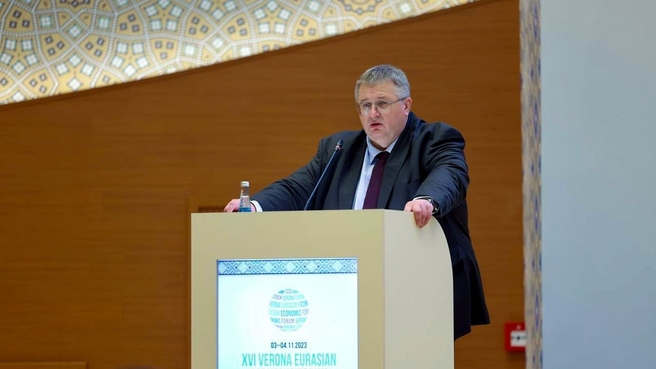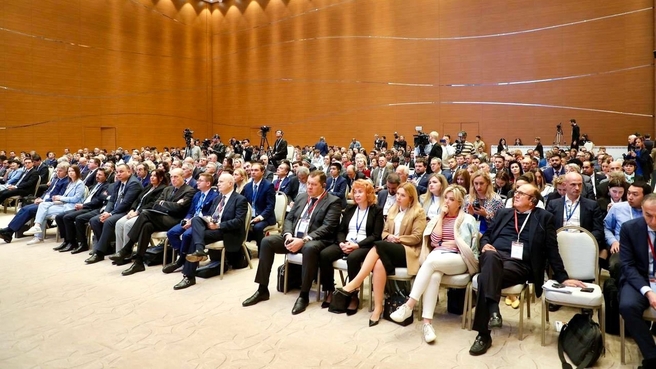Deputy Prime Minister Alexei Overchuk spoke at the plenary session of the 16th Verona Eurasian Economic Forum, aimed at developing dialogue in Greater Eurasia.
This year’s forum is being held in Samarkand, Republic of Uzbekistan, under the motto “The Art of Innovation”. As part of the business programme, political and public figures, experts, and representatives of companies and financial institutions, international and regional organisations of the EAEU, SCO, and BRICS member states, as well as European and Asian countries are discussing new mechanisms for trade, investment and technological cooperation, prospects for the development of raw materials and energy markets, various aspects of restructuring logistics and transport routes given changing global realities, solutions for financial and banking services markets, food security and agricultural development, opportunities and challenges related to the introduction of new technologies, and prospects for industrial and technological cooperation within Greater Eurasia.
Excerpts from the transcript:
Alexei Overchuk: Good afternoon, ladies and gentlemen. Today is exactly one year since we met in Baku. I would like to thank President of the Conoscere Eurasia Association Antonio Fallico for his tenacity and exemplary optimism. However, there is still little room for optimism. A year ago, the forum left Verona and began its great journey. Last year’s location was symbolic: Baku, Azerbaijan, is one of the main elements of the North – South corridor, and this year the forum is being held even farther from Europe, which also has symbolism as Europe and Russia have grown even farther apart over the year. I think that it would be more logical to hold the next forum at some venue in Shanghai.
There is probably some symbolism in the fact that the forum was postponed by a day. When preparing this speech, I re-read what I said in Baku last year, and it turned out that the Verona Forum last year also kicked off on 3 November. This is a good occasion then to sum up some results, since a whole year has passed.
The theme of this entire year has been the “sanctions from hell,” which were aimed at destroying the Russian economy. Russia has become the world record holder for sanctions, leaving Iran and North Korea far behind; they are probably jealous of us. In fact, we are no longer interested in whether there is one more or one less sanction, though, of course, such initiatives as the ban on the import of knitting and sewing needles into the Russian Federation naturally got our attention.
Under the sanctions, the economy has learned not only how to survive or just live, but how to grow. There is a proverb in Russia, a peasant only crosses himself once the thunder starts. The Americans say: what doesn’t kill you, makes you stronger. This is folk wisdom, and it works in both cases. The truth is that sanctions have given a powerful boost for the development of the Russian economy.
This year, a completely Russian-made Sukhoi Superjet, a regional aircraft made with Russian parts, took off; a medium-range aircraft MC-21 with Russian-built turbofans entered service; and just two days ago the new Il-96-400M, a wide-body, long-range aircraft took off. Not good news for Airbus.
Last year, at the start of the sanctions period, we were told that the drop in the economy will exceed 20 percent. In fact, the economy has quickly adapted: the decline in GDP was only 2.1 percent at the end of 2022. Over the nine months of 2023, GDP in Russia grew by 2.8 percent; in August and September, growth accelerated to 5.2 percent. The quality of this growth is important: it was not at the expense of energy resources, not at the expense of hydrocarbons. The production of computers and electronics in the Russian Federation increased by 34.5 percent, electrical equipment by 22.2 percent, and furniture by 21.7 percent this year. It is very important to note the record low unemployment rate of 3 percent and the 7.5 percent increase in real wages.
It is especially gratifying, and I would like to make it a point, that the countries that maintain allied relations with Russia are also growing along with us. The GDP growth of the five EAEU countries in 2022 was: 12.6 percent in Armenia, 3.2 percent in Kazakhstan, and 7 percent in Kyrgyzstan. We can see good GDP growth figures here in Uzbekistan as well. Even in Belarus, which is under sanctions like Russia, the decline in the economy amounted to only 4.7 percent last year, despite the fact that, in theory, the economy there should have come to a complete stop; and in 2023 their economy began to grow confidently instead.
Such an important indicator as inflation is always an object of attention. While in 2022, inflation in the EAEU member countries was 12.9 percent, in the European Union it was 19.3 percent. Moreover, in such countries of the post-Soviet space as Moldova, Estonia, Latvia and Lithuania, the inflation rate ranged from 30 to almost 38 percent, while in Russia-friendly countries of the post-Soviet space, inflation was at a level of 6.6–20.3 percent in that same period.













